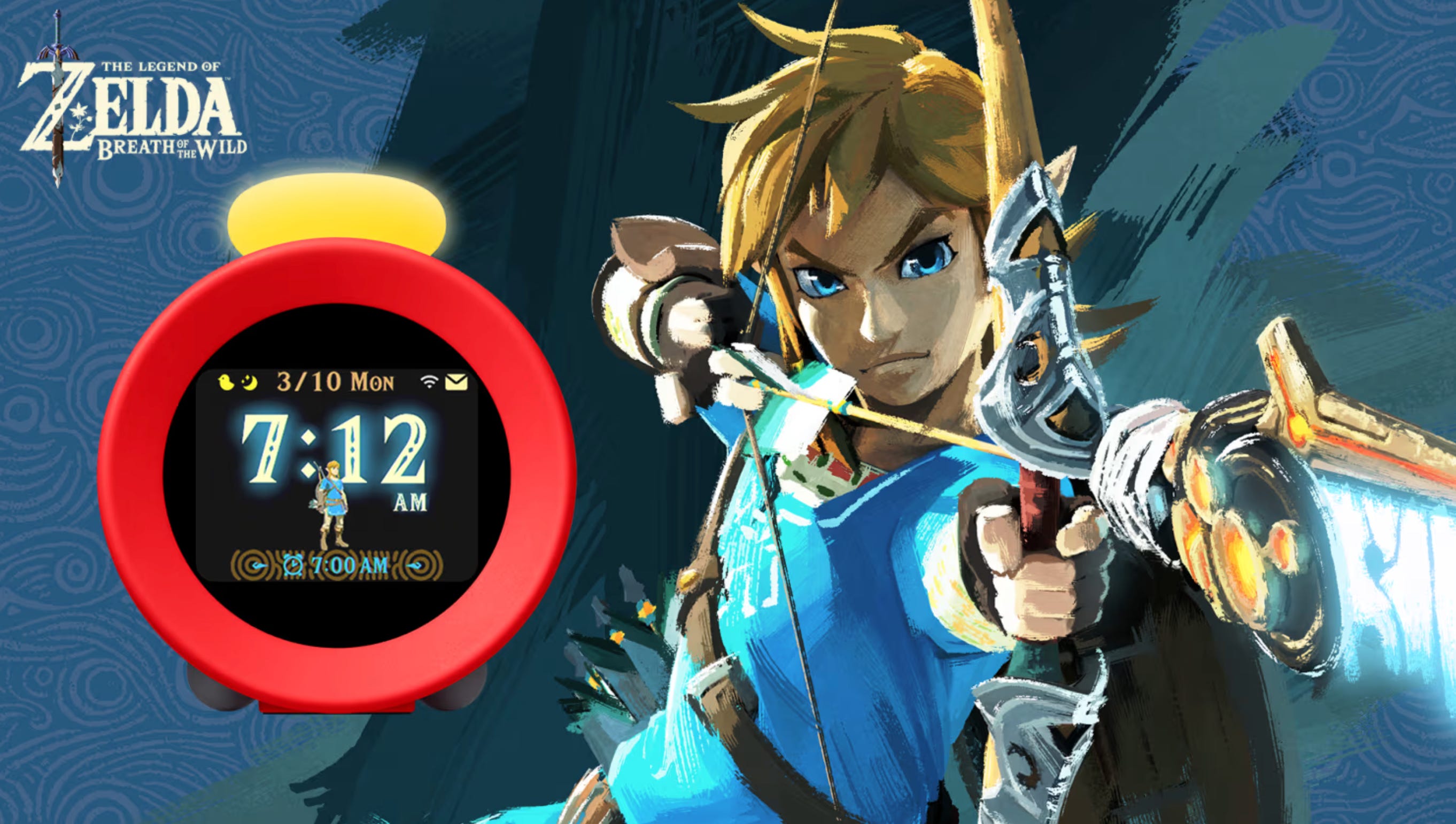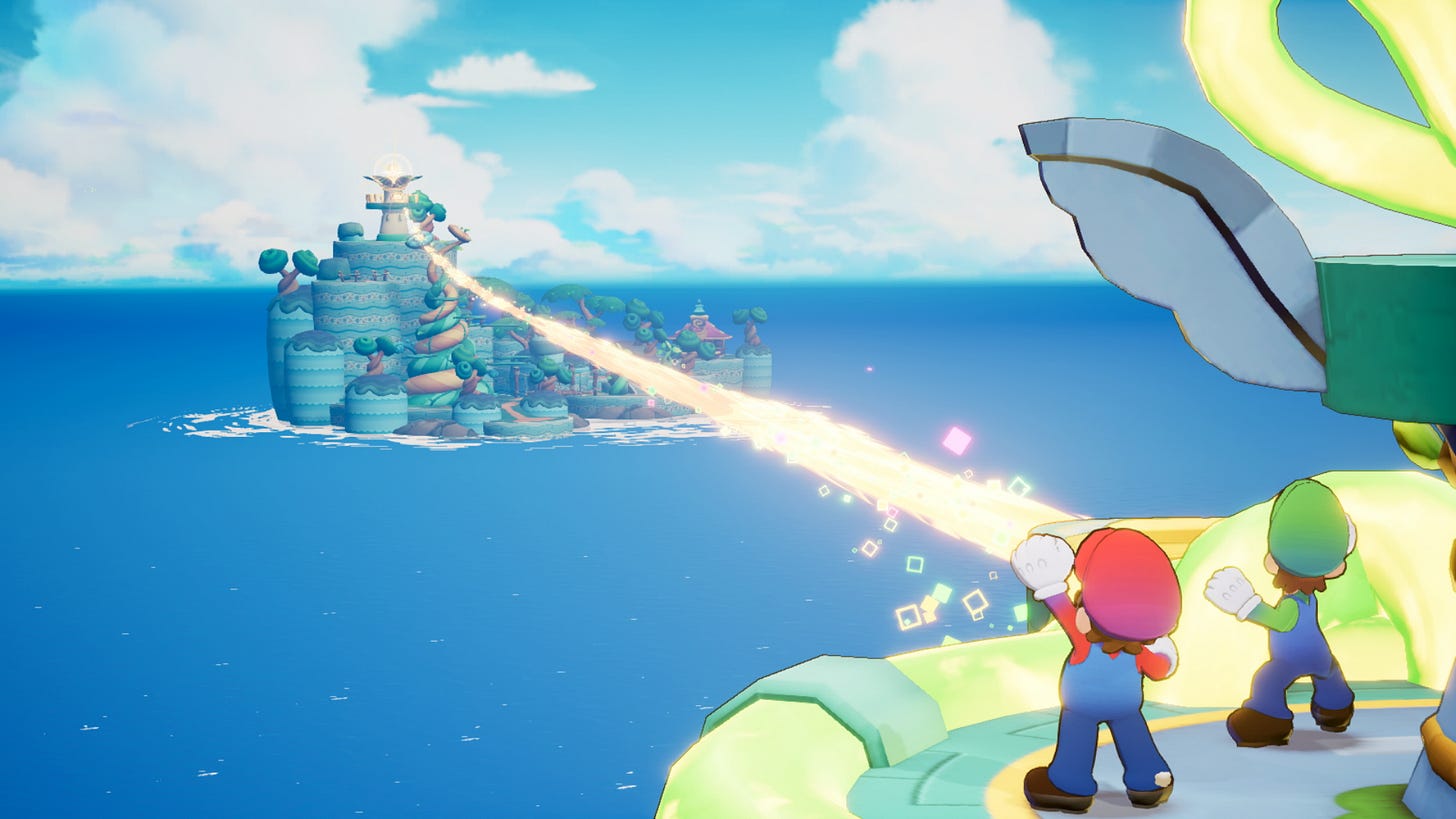Nintendo's new $100 clock is the welcome return of weird Nintendo
Alarmo isn't what I was looking for, and the fine print suggests it probably wouldn't work for me. But I'm glad it's happening.
I had expected to spend the middle of this week writing about a new Mario game–possibly the last major Mario game that Nintendo will release on the Switch.
And I’ll get to that.
But Nintendo did a very Nintendo thing yesterday—no, they didn’t sue someone—and announced a $100 alarm clock called the Alarmo.
It plays Nintendo game music to wake you up and uses a motion sensor to make video game sounds synced to your body movements, as you pick your rested bones out of bed.
“The music combines with sound effects created by your movement, so you can start the day feeling like you’re in the kingdom of Hyrule,” according to the narrator in the clock’s official trailer.
While I have some concerns about Alarmo after reading some fine print, I’ll submit that this is the Nintendo I want to see and one that I’ve missed.
My favorite Nintendo is weird Nintendo
It’s the Nintendo that offers you the thing you were least likely to ask for.
It’s the Nintendo that, back in 2018, announced a set of user-assembled cardboard peripherals for the Switch. They turned the planet’s hottest gaming system into an interactive house or a tiny piano.
It’s the Nintendo from 2014 that released a downloadable baseball game that let you haggle with a virtual dog to buy its expansions at a lower price.
It’s is the Nintendo that announced a Wii Mini after launching the Wii U, and a 2DS years after releasing the 3DS.
It’s the Nintendo that says, sure we can put our energy into making another Zelda, another Metroid, another Wave Race but we can also make you an experimental clock?
I thought this Nintendo, this creator of the unexpected, might have disappeared. In recent years, it seemed all but replaced by a conveyor of expected sequels and brand-extending movies and theme parks.
But here it is selling a clock that is coming out in 2025, but you can buy it now from the company’s New York store or if you subscribe to Nintendo Switch Online (What, you wanted your NSO to give you access to GameCube games or something?)
Make no mistake, this isn’t just the return of Weird Nintendo. It’s the annual door-knock from We-Love-To-Sell-You-More-Plastic Nintendo. That’s the Nintendo of the Wii Wheel, the NES Mini, the Wii Balance Board, hundreds of Amiibos, buckets of Nintendo Lego set and, who could forget, the Wii Zapper.

Don’t be fooled.
The Alarmo clock is no mere novelty product. It’s not a simple Mario-themed timepiece that says “let’s-a-go!’ to wake you up.
No, this is a motion-sensing device for which Nintendo has posted a four-part developer Q&A that details a creation process that stretches back to Covid lockdowns.
As for my fine-print concerns…I’m not sure Alarmo will work for me and maybe some other readers. The clock’s sensor—which Nintendo stresses is not a camera and therefore can’t capture or transmit any compromising personal info—tracks a person’s body even through obstructions such as sheets or blankets.
Unfortunately, Nintendo says the motion sensor may get confused by…
The presence of a second person in the bed
A pet
An electric fan
Any of those can lead to the alarm going off when it shouldn’t, as the device gets confused about whether the sleeper it was tracking really got out of bed.
(In the Q&A, one of the clock’s developers notes: “...about half of the development team members are using it in an environment where other family members are present, but I don’t think we’ve heard many complaints that it’s not user-friendly.”)
To compensate, Nintendo offers a Button Mode for the clock. You can turn off the motion sensor and just use it like a regular alarm clock.
But that’d be too normal.
Bring on a Nintendo lawnmower next.
Item 2: Mario’s last big Switch game?
Mario & Luigi: Brothership, the upcoming Switch game with a marquee November release date, is a sailing adventure with more strategic combat than is typical for the series, I learned after playing the game for about an hour during a Nintendo preview event last week.
It is not quite a Super Mario: Wind Waker, to reference the great 2002 Zelda adventure that allowed players to sail as Link across an open ocean.
It’s a more methodically-traveled affair.
In Brothership, brothers Mario and Luigi have a boat—technically a mobile landmass called Shipshape Island—and a mission to reconnect the fractured islands that were once part of a grand continent.
Players are given access to an ocean map filled with looping routes. Pick a route and Shipshape will sail through it in real-time. As it travels, you can explore the island base and chat with an expanding cast of characters.
The main work on the island is to march the brothers to Shipshape’s bow so they can peer—in a first-person view—out to the horizon, looking to spot islands, reefs and other landmarks.
Find a big enough landmass, and the brothers can hop into a cannon and launch themselves over to explore it. The island destinations constitute mini-adventures for Mario & Luigi, each culminating in a goal to climb a lighthouse and send a jolt of electricity back to Shipshape to link the broken lands. Players can then warp the brothers to each connected island to continue the adventure. A promotional video we were shown during the demo promised a diverse set of island themes, including forests and cities.
For the on foot sections, Brothership plays much like prior Mario & Luigis, with a single player controlling both brothers at once as they chat with locals, run and jump through each island and enter into lots (lots!) of battles. Luigi can be dispatched with the tap of a button to do a lot of the busy-work, like collecting nearby loot.
The game’s battles, as before, are turn-based, with the brothers teaming up for more powerful moves.
A new twist comes in the form of craftable “plugs” (note the game’s electricity theme) that offer effects that last across multiple fights. Plugs trigger perks that add extra oomph to attacks—splash damage, dizzying, etc—or that auto-activate healing items and other assists when the brothers are in trouble. The catch is that the plugs, while active for many turns, need to then recharge across many more. Players are therefore incentivized to use them in battle but to also be prepared to frequently switch them out.
Brothership is the first new Mario & Luigi game since 2015, and the first since series development studio AlphaDream went out of business in 2019. Nintendo, as is their secret style these days, hasn’t said exactly who is making this one, though did tell Game File a few months back that “some of the original developers who worked on the franchise are involved in the development of Mario & Luigi: Brothership.”
The team on it at least seems plenty skilled. The game is beautifully animated, and both the sailing and combat made good first impressions. The old Mario & Luigi games also had some of Nintendo’s funnier scripts, though I hammered through Brothership’s demo dialogue too quickly to compare.
Nintendo games typically preview well, though lengthy role-playing games are among the hardest to assess from even an hour-long demo. Brothership seemed good, I’ll say, but do factor in that I’m also a sucker for entries in the tiniest subgenre: Video game with mobile bases. Give me a Zelda with Link exploring Hyrule via a gradually upgraded locomotive. Give me an Assassin’s Creed whose twin protagonists hang out on a train that loops through Victorian London. Sure, I’m down for a Mario & Luigi role-playing cruise.
Item 3: In brief…
❗️ Roblox was under fire this week after a searing report from Hindenburg Research that claims the company is over-inflating its user numbers and is rife with child predators.
Roblox called the report “misleading,” saying its daily active user counts are not presented as counts of individual users and pointed to a recent company post about its efforts to protect kids on its popular platform from harm. (That post followed a July expose from Bloomberg about pedophiles trying to use Roblox).
Hindenburg, which makes money as a short-seller—betting a company’s stock price will drop—said Roblox’s replies were inadequate. But one expert called the group’s report “loud but largely toothless” and Roblox’s stock has already largely recovered from a Hindenburg-inflicted dip.
🔎 EA’s Respawn Studios will now reveal minimum drop rates for Apex Legends’ loot boxes out to three decimal places, a new level of specificity that is in compliance with new South Korean gaming regulations, IGN reports.
😲 Dreamhaven, the company founded by Blizzard co-founder Mike Morhaime, has revealed its first game. Sunderfolk is a strategy game designed for couch co-op, as players control colorful fantasy characters in battles spread across grids of hexagons.
A key twist is that the 2025 console and PC game uses players’ phones or tablets as the controller.
🤔 Another Nintendo oddity: The company will allow select Nintendo Switch Online users to participate later this month in an online test of a “new feature” for NSO users. No word on what it’ll be: Game streaming? A social network? Take your guess.
❓ Concord, the live-service shooter Sony quickly pulled last month, keeps getting back-end updates on PC, 80LV notes. It’s unclear what the activity indicates.
👋 Sony is delisting its PS4 exclusive LittleBigPlanet 3 at the end of October, following a shutdown of the game’s servers earlier this year after hacking attacks and technical challenges, IGN reports.
The server shutdown cut off access to user-made levels in the creativity-focused game, but the game will still be playable even after the delisting.
⚱️ Rise of the Golden Idol, Color Gray’s sequel to 2022 murder mystery game The Case of the Golden Idol (one of my favorite games), will be out Nov. 12 on PC, consoles and phones (via Netflix).
🥇 Demis Hassabis, a former programmer at Lionhead and Bullfrog who worked on games such as Theme Park, has won the Nobel Prize for Chemistry for his company DeepMind’s work predicting the structures of proteins, PC Gamer reports.
Fun fact: In 2004, Hassabis participated in a New York Times profile I wrote about his colleague, the influential game designer Peter Molyneux.









Honestly Nintendo should just collapse as a company.